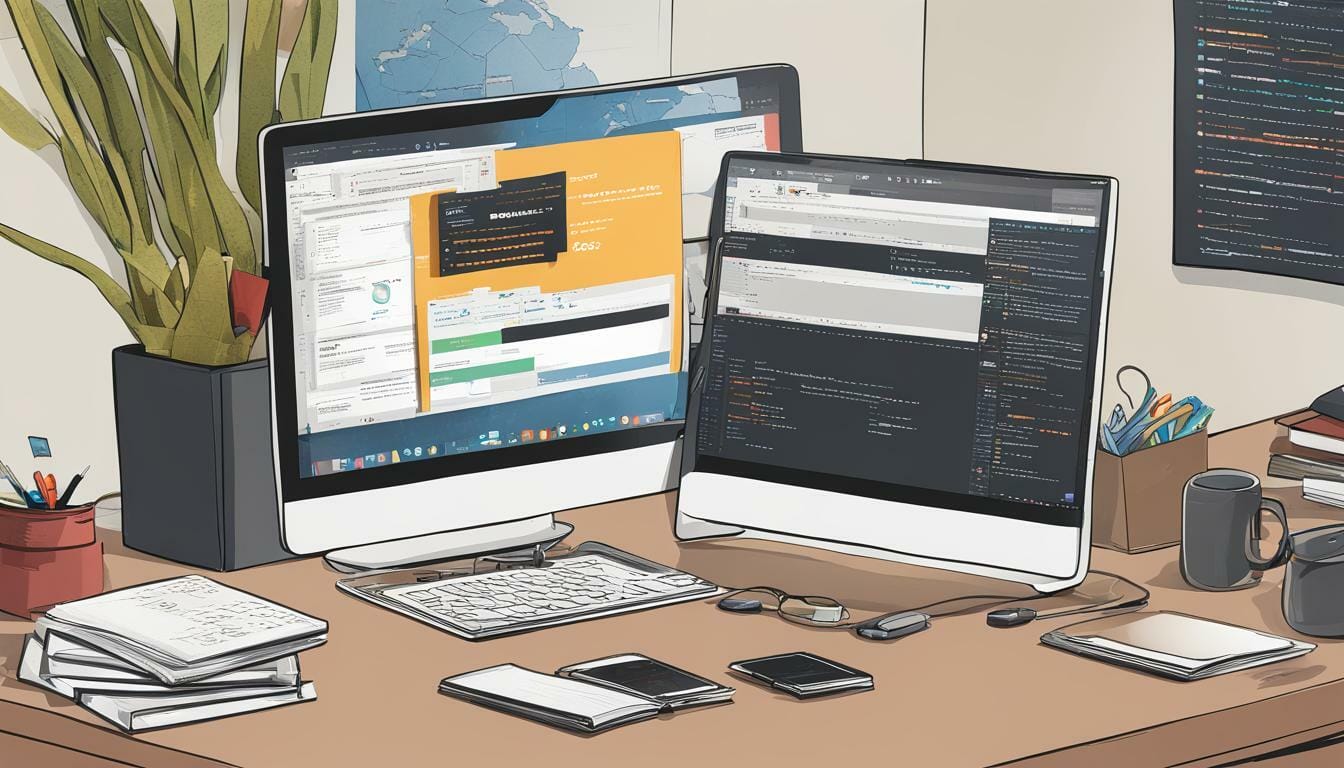Your Guide to Getting into Competitive Programming Today

Are you ready to improve your coding skills? Engaging in competitive programming is an ideal way to challenge yourself and showcase your talents on a global platform. No matter your experience level, there’s always a chance to refine your skills and learn new techniques.
In this guide, I’ll provide you with everything you need to know to get started with competitive programming. From understanding what it is and why it’s important, to tips for success and the best resources to use, I’ve got you covered.
So, let’s dive in and discover the exciting world of competitive programming!
Key Takeaways
- Competitive programming is a way to challenge yourself and showcase your coding abilities.
- Whether you’re a beginner or experienced programmer, there’s always room for improvement.
- This guide provides you with the tools you need to get started and succeed in competitive programming.
What is Competitive Programming?
Competitive programming is a sport of sorts that involves solving algorithmic problems in a limited amount of time. It is a popular activity among computer programmers, who participate in coding competitions to showcase their skills and compete with other programmers from around the world.
Competitive programming is not just about coding fast, but also about coding efficiently and effectively. Competitors are required to solve complex problems and design optimal code structures to deliver the best results within the given time frame.
Competitive programming is an exciting way to challenge yourself, improve your coding skills, and network with other programmers. It is also an excellent way to prepare for technical interviews and hone your problem-solving abilities.
As competitive programming gains more popularity, it is becoming an essential skill for programmers who want to stay ahead in their field.

Why Should You Get into Competitive Programming?
Competitive programming is not just about winning contests; it’s a great way to develop your coding skills and make a name for yourself in the coding community. Whether you’re a beginner or an experienced programmer, competitive programming offers a wide range of benefits that can help you improve your coding skills and advance your career.
First and foremost, participating in competitive programming competitions can help you hone your problem-solving abilities. You will be presented with a range of coding challenges that require you to think critically, apply your knowledge of coding languages and algorithms, and develop creative solutions to complex problems. These skills are invaluable in the real world and can help you stand out in the job market.
In addition, competitive programming can help you meet other like-minded coders and expand your professional network. Many competitions are held online, which means you can participate from anywhere in the world and connect with other programmers from diverse backgrounds and skill levels. These connections can lead to valuable mentorship opportunities, collaborations, and even job offers.
Finally, competitive programming allows you to put your skills to the test and see how you measure up against other programmers from around the world. You will gain confidence in your abilities and be able to showcase your skills to potential employers or clients. It’s a great way to build your portfolio and establish yourself as a skilled and knowledgeable programmer.
If you’re looking to take your coding skills to the next level and gain valuable experience in the competitive programming world, then there’s no better time to get started than today!

How to Start Competitive Programming?
If you’re a beginner looking to get into competitive programming, there are certain steps you need to follow. While it may seem daunting at first, with time and practice, competitive programming can become an exciting and rewarding experience.
Step 1: Learn the Basics
The first thing you need to do as a beginner is to learn the basics of coding. You need to have a good understanding of programming concepts like variables, loops, and functions. You can start by learning a programming language, such as Python, which is easy to learn and widely used in competitive programming.
Step 2: Choose a Suitable Platform
Next, you need to choose a suitable platform to practice and participate in competitive programming. There are several online platforms available, such as Codeforces, HackerRank, and Topcoder, that offer various challenges and contests for programmers of all levels.
It’s important to choose a platform that suits your level of expertise. As a beginner, you can start with simpler challenges and work your way up to more complex ones. Some platforms also offer tutorials and resources to help you improve your skills.
Step 3: Practice, Practice, Practice
Practice is key to becoming a successful competitive programmer. You need to consistently solve coding challenges and participate in competitions to improve your skills. Start with simpler challenges and build your way up to more difficult ones as you gain confidence.

It’s also important to analyze your mistakes and learn from them. Take time to understand the solutions to problems you couldn’t solve, and try to implement them in your future attempts.
Step 4: Join a Community
Joining a community of other competitive programmers can also be beneficial. You can learn from their experiences, exchange tips and tricks, and participate in group challenges. There are several online communities available, such as the Competitive Programming subreddit and the Codeforces forum.
Remember, getting into competitive programming requires dedication and effort. With consistent practice and a passion for coding, you can improve your skills and excel in competitions.
Competitive Programming Tips for Success
Competitive programming requires a combination of strong technical skills and effective problem-solving abilities. Here are some tips to improve your competitive programming performance:
- Practice consistently: Regular practice is crucial to improve your programming skills. Dedicate time each day to solving problems and participating in competitions.
- Start with easy problems: Don’t be afraid to start with easier problems and work your way up. This will help you build confidence and develop your problem-solving abilities.
- Learn from others: Participate in online forums, attend live events, and network with other competitive programmers to learn from their experiences and gain new insights.
- Focus on speed and accuracy: In competitive programming, speed and accuracy are key. Work on improving both to increase your chances of success.
- Stay up-to-date: Keep up with the latest programming languages, tools, and technologies to stay competitive and relevant.
- Take breaks: Don’t forget to take regular breaks to avoid burnout and maintain a healthy balance in your life.
By following these tips, you can enhance your competitive programming skills and increase your chances of success in competitions. Remember to stay motivated, stay focused, and always keep learning.

Best Resources for Competitive Programming
If you want to excel in competitive programming, it is important to have access to the best resources available. Here are some of the top resources that can help you sharpen your skills:
| Resource | Description |
|---|---|
| HackerRank | A popular platform for practicing coding challenges and preparing for coding interviews. |
| LeetCode | A platform with a vast collection of coding problems and challenges, with solutions and discussion forums for each problem. |
| Codeforces | A competitive programming platform with regular contests and problems of varying difficulty levels. |
| TopCoder | A website that hosts competitive programming contests and provides tutorials and problem archives. |
| Google Coding Competitions | A series of annual coding competitions hosted by Google, spanning various levels of difficulty and featuring cash prizes. |
In addition to these websites, you can also find helpful tutorials and articles on GeeksforGeeks and CodeMentor. You can use these resources to learn new algorithms, data structures and programming techniques, as well as to practice your problem solving skills.
As you progress in competitive programming, you may also want to invest in books such as Competitive Programming 4 by Steven Halim and Felix Halim, or Introduction to Algorithms by Thomas H. Cormen, Charles E. Leiserson, Ronald L. Rivest, and Clifford Stein. These books provide in-depth coverage of advanced programming concepts and strategies that can help you solve complex problems more efficiently.

With all these resources at your disposal, you can confidently start your competitive programming journey and aim for success in competitions. Remember to stay persistent, practice regularly, and approach each challenge with an open mind and a problem-solving mindset.
Competitive Programming Tutorials and Practice
If you’re serious about improving your competitive programming skills, there are many resources available to help you along the way. Tutorials and practice problems are an excellent way to not only enhance your coding abilities but also gain exposure to the types of problems you may encounter in competitions.
One of the most well-known tutorial platforms is Codeforces, which offers a wide range of problem sets and contests for programmers at all levels. The site also provides a unique virtual participation feature, allowing users to compete in past contests and compare their scores with others.
HackerRank is another popular site offering practice problems, tutorials, and competitions. The platform also includes coding challenges from top companies such as Amazon, Google, and Facebook, allowing users to gain practical coding experience while potentially catching the eye of future employers.
For those looking to practice with a specific programming language, LeetCode offers a variety of exercises and challenges in languages such as Java, Python, and C++. Additionally, the site provides a mock interview feature, allowing users to prepare for real-world coding interviews.
CodeChef is another popular resource for competitive programming tutorials and practice problems. The site offers monthly coding challenges and hosts numerous contests throughout the year, providing ample opportunities for users to put their skills to the test.

Remember, consistent practice is key to developing your competitive programming abilities. Utilize these resources and make coding a regular part of your routine to see significant improvements in your skills over time.
Competitive Programming Courses
If you are serious about competitive programming, online courses are an excellent way to improve your skills and knowledge. These courses are designed by experienced competitive programmers, and they cover a broad range of topics, from data structures to game theory.
The best part about online courses is that they allow you to learn at your own pace. Most courses provide video lectures, assignments, and quizzes, which you can complete whenever you have time. They also offer forums where you can ask questions and interact with the instructors and other students.
Here are some of the best online courses for competitive programming:
| Course Name | Platform | Level |
|---|---|---|
| Algorithmic Toolbox | Coursera | Beginner |
| Competitive Programmer’s Core Skills | edX | Intermediate |
| CP Algorithms | cp-algorithms.com | Advanced |
Algorithmic Toolbox is a beginner-level course offered by Coursera. This course will teach you the fundamental concepts of competitive programming, such as dynamic programming, greedy algorithms, and graph algorithms. It is an excellent starting point if you are new to competitive programming.
Competitive Programmer’s Core Skills, offered by edX, is an intermediate-level course that covers advanced topics such as number theory, string algorithms, and advanced data structures. It is ideal for those who want to take their skills to the next level.
CP Algorithms is an advanced-level course offered by cp-algorithms.com. This course is designed for experienced competitive programmers who want to learn advanced techniques such as persistent data structures, FFT, and geometry algorithms.

These courses are just a few of the many options available online. They provide an excellent opportunity to learn from experts and improve your competitive programming skills.
Advanced Competitive Programming Techniques
As you progress through your competitive programming journey, you’ll want to explore advanced techniques and strategies to gain an edge over your competition. Here are some advanced techniques to consider:
Dynamic programming
Dynamic programming is a technique used to solve complex problems by breaking them down into smaller, more manageable subproblems. It involves storing the results of subproblems in memory to avoid recalculating them, making the algorithm more efficient. This technique is particularly useful in programming competitions that involve optimization problems.
Divide and conquer
The divide and conquer technique involves breaking down a problem into smaller sub-problems and solving them individually to arrive at a solution for the original problem. This technique is often used in sorting and searching algorithms and is particularly useful in competitions that involve recursive problems.
Greedy algorithms
Greedy algorithms involve making the locally optimal choice at each step in the problem-solving process, with the hope that the end result will be globally optimal. This technique is often used in optimization problems that involve making a series of decisions to achieve the best possible outcome.
Backtracking
Backtracking is a technique used to solve problems that involve making a series of decisions. It involves trying out different possible solutions and undoing them if they don’t lead to the desired result. This technique is often used in problems that require exhaustive search and is particularly useful in competitions that involve puzzles and games.
Remember, mastering competitive programming takes time and practice. Don’t be discouraged if you don’t see results right away. Keep pushing yourself to learn and apply these techniques, and you’ll be well on your way to becoming a competitive programming expert.

Putting Your Skills to the Test: Competitive Programming Competitions
Competitive programming competitions are the ultimate test for any aspiring coder looking to challenge their skills. These competitions put your programming abilities to the test, allowing you to compete with other programmers from around the world.
There are several online platforms that host competitive programming competitions, such as CodeChef, HackerRank, and TopCoder. These platforms offer a variety of contests, ranging from beginner-level challenges to advanced-level competitions for seasoned professionals.
Participating in these competitions can help you enhance your programming skills, learn from other experienced coders, and build your professional network. You can also win prizes and gain recognition for your achievements.
Some of the most popular competitive programming competitions include the International Collegiate Programming Contest (ICPC), Google Code Jam, and Facebook Hacker Cup. These competitions attract top talent from around the world, and winning them can open up numerous career opportunities in the tech industry.
So, if you’re looking to take your coding skills to the next level, participating in competitive programming competitions is a great way to do so. Just remember to practice and stay up-to-date with the latest programming techniques and strategies.

Conclusion
Getting into competitive programming can be an exciting and rewarding journey for any coding enthusiast. By participating in competitions, you can challenge yourself, improve your skills, and even land career opportunities.
Throughout this guide, we have covered the basics of what competitive programming is, the benefits of participating, and resources to help you get started. Remember, as a beginner, it’s important to take it one step at a time and practice consistently. Use the tips and strategies we’ve shared to refine your skills and keep pushing yourself.
Whether you’re a seasoned programmer or just beginning, there is always room to improve and grow. Don’t be afraid to take risks, learn from your mistakes, and embrace the challenges that come your way.
I hope this guide has inspired you to take the first steps towards getting into competitive programming. With dedication and hard work, you can achieve your goals and become a successful competitive programmer. Good luck on your journey!
FAQ
Q: What is competitive programming?
A: Competitive programming is a mind sport where participants solve algorithmic problems within a specified time limit. It combines problem-solving skills, coding proficiency, and speed to excel in competitive programming competitions.
Q: Why should I get into competitive programming?
A: Participating in competitive programming can significantly enhance your problem-solving abilities, improve your coding skills, and provide valuable learning opportunities. It also opens doors to prestigious coding competitions and potential career opportunities in the tech industry.
Q: How do I start competitive programming?
A: To start competitive programming, you can follow these steps:
1. Learn programming fundamentals and choose a preferred programming language.
2. Familiarize yourself with basic algorithms and data structures.
3. Solve practice problems on online platforms to improve your problem-solving skills.
4. Participate in local coding competitions and contests to gain experience.
5. Analyze and learn from other programmers’ solutions to improve your approach.
Q: What are some tips for success in competitive programming?
A: Here are some tips to enhance your competitive programming skills:
1. Practice regularly and solve a variety of problems.
2. Learn efficient algorithms and data structures.
3. Analyze and understand the solutions of experienced programmers.
4. Participate in coding contests to challenge yourself and gain experience.
5. Collaborate and learn from others in the competitive programming community.
Q: What are the best resources for competitive programming?
A: Here are some highly recommended resources for competitive programming:
1. Online coding platforms like Codeforces, Topcoder, and LeetCode.
2. Competitive programming websites such as GeeksforGeeks and HackerRank.
3. Books like “Competitive Programming” by Steven Halim and Felix Halim.
4. Online tutorials and video lectures on platforms like YouTube and Coursera.
5. Online coding communities and forums where you can interact with fellow competitive programmers.
Q: Are there any competitive programming courses available?
A: Yes, there are various competitive programming courses available online, such as:
1. “Introduction to Competitive Programming” on Coursera.
2. “Algorithms and Data Structures for Competitive Programming” on Udemy.
3. “Advanced Competitive Programming” on CodeChef.
Taking these courses can help you learn advanced techniques, algorithms, and strategies used in competitive programming.
Q: What are some advanced competitive programming techniques?
A: Some advanced techniques that can give you an edge in competitive programming include:
1. Dynamic programming
2. Graph algorithms (e.g., Dijkstra’s algorithm, Bellman-Ford algorithm)
3. Number theory and modular arithmetic
4. Divide and conquer
5. Computational geometry
It’s important to understand these techniques and practice implementing them in solving complex problems.
Q: How can I participate in competitive programming competitions?
A: To participate in competitive programming competitions, you can:
1. Register on coding competition platforms like Codeforces and Topcoder.
2. Keep an eye out for upcoming competitions and contests.
3. Solve practice problems to prepare yourself for the challenges.
4. Submit your solutions during the competition and aim to maximize your score.
Participating in competitions is a great way to test your skills and gain recognition in the competitive programming community.






